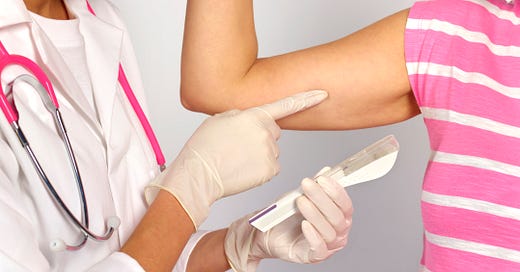I have a Nexplanon and I am in my 40s. How will I know if I am in menopause? My doctor just shrugged her shoulders.
Instagram
Short take…
We don’t have a lot of data on Nexplanon and menopause, although it is a safe contraceptive for the menopause transition. The hormone in Nexplanon may impact some of the symptoms of the menopause transition, so knowing when menopause has actually started may not be possible (and that’s medically okay). However, there are definitely ways to manage the transition from Nexplanon to menopause.
Tell Me More…
Nexplanon is a contraceptive implant that contains the hormone etonogestrel, which is a type of hormone known as a progestin (a progesterone-like hormone). It is a plastic rod that measures 4 cm in length and 2 mm in diameter that is placed under the skin in the upper arm. It releases about 60 mcg of etonogestrel a day. It is FDA approved for up to three years. Nexplanon is highly effective, reversible contraception. As it doesn’t have estrogen, it is safe for women who can’t take estrogen-containing birth control pills.
Nexplanon works by suppressing ovulation, specifically by preventing the midcycle surge of luteinizing hormone or LH, which is a hormone released by the brain that is essential for the final steps in getting the egg ready for ovulation and triggering ovulation. No LH surge, no ovulation and of course no pregnancy. Initially, the hormone in Nexplanon is enough to completely suppress development of the eggs and estrogen levels can be lower than typical, but by 6 months the hormone is only sufficient to prevent the surge of LH. At this point, each cycle will start as it typically does, with several egg-containing follicles beginning to develop and estrogen levels will be in the normal range for that time of the cycle. It’s just with Nexplanon the eggs can’t develop to the point of ovulation so they regress or disappear and then with the next cycle a new batch gets recruited. Nexplanon is not associated with a loss in bone density likely because estrogen levels remain in the normal range. The hormone in Nexplanon also thickens cervical mucus making it inhospitable to sperm (as an aside, “Inhospitable to Sperm” is a great name for a punk band).
Nexplanon affects our ability to diagnose menopause because the diagnosis of menopause is based on being one year from the final menstrual period and Nexplanon affects ovulation and hence menstruation.
As an aside, as people often ask, hormone testing for menopause is not reliable until you are more than a year from the final menstrual period, and by then there is no point. During the menopause transition (the years leading up to menopause, also known as perimenopause or premenopause) hormones levels are chaotic cycle to cycle, so one month tests could look like someone is in menopause and the next month they could be normal. Sometimes this frustrates people, but just like we don’t need blood tests to tell when puberty has ended and adulthood begins, we don’t need a test to know when the menopause transition starts or menopause itself has occurred as long as it is at the right time of life (meaning over the age of 40).
Nexplanon won’t change the age of menopause. The same number of eggs gets recruited to develop each cycle, it’s just they hit a Nexplanon wall each month. However, as Nexplanon can affect menstrual bleeding and it could possibly influence some other symptoms of menopause, there are definitely some things to know.
This is an excerpt from today’s subscriber-only Ask Dr. Jen. To read the entire article and get full access to the archives, you can subscribe for $5 a month or $50 a year.




